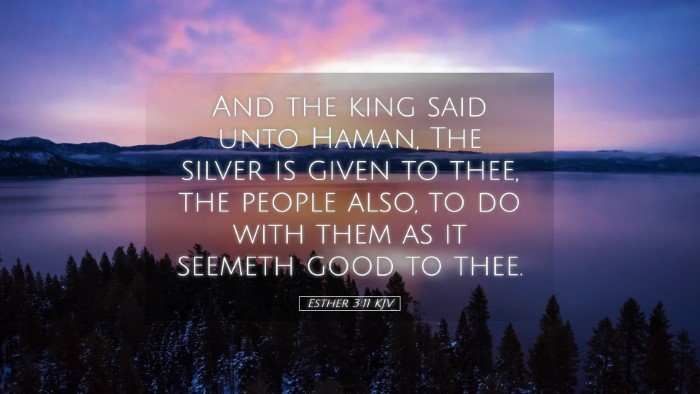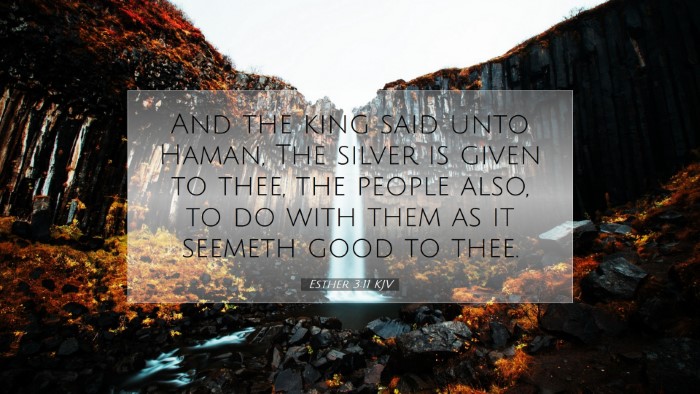Old Testament
Genesis Exodus Leviticus Numbers Deuteronomy Joshua Judges Ruth 1 Samuel 2 Samuel 1 Kings 2 Kings 1 Chronicles 2 Chronicles Ezra Nehemiah Esther Job Psalms Proverbs Ecclesiastes Song of Solomon Isaiah Jeremiah Lamentations Ezekiel Daniel Hosea Joel Amos Obadiah Jonah Micah Nahum Habakkuk Zephaniah Haggai Zechariah MalachiEsther 3:11
Esther 3:11 KJV
And the king said unto Haman, The silver is given to thee, the people also, to do with them as it seemeth good to thee.
Esther 3:11 Bible Commentary
Commentary on Esther 3:11
Bible Verse: Esther 3:11 - "And the king said unto Haman, The silver is given to thee, the people also, to do with them as it seemeth good to thee."
Introduction
This verse from the Book of Esther highlights an important moment in the narrative where King Ahasuerus grants authority to Haman to act against the Jewish people. The implications of this action resonate throughout the text, prompting deep theological reflection on power, authority, and the sovereignty of God amidst human plots.
Historical Context
Esther is set during the Persian Empire's reign, with King Ahasuerus (commonly identified as Xerxes I) at the helm. The backdrop of this story involves themes of exile, cultural identity, and survival, mirroring the experiences of the Jewish people in a foreign land.
Theological Reflection
The granting of authority to Haman by the king introduces the conflict that propels the narrative. It raises theological questions regarding divine sovereignty versus human authority. Are the actions of Ahasuerus influenced by divine guidance? This tension between God's plan and human decision-making reflects a broader theme throughout Scripture.
Insights from Matthew Henry
Matthew Henry, in his commentary, emphasizes the rashness and folly of Ahasuerus in his decision-making. He remarks on how power can lead to the oppression of the innocent and how easily rulers can be manipulated by wicked individuals like Haman.
- Henry notes the importance of accountability among leaders: "Rulers must remember they have a higher authority to answer to."
- He also reflects on the carelessness of the king's rule: "Ahasuerus gives Haman the liberty of pursuing his vendetta without discernment, showcasing a disregard for justice."
Insights from Albert Barnes
Albert Barnes highlights the implications of Haman’s power and the symbolic nature of silver in this transaction. He suggests that money often plays a pivotal role in decisions of both kings and counselors alike, indicating a corrupting influence in the realm of governance.
- Barnes elaborates: "Haman’s offer to pay for the massacre reveals both his ambition and the moral decay inherent in the leadership of the time."
- He warns of the social and ethical implications: "The pursuit of wealth can lead to the despotism of the wealthy over the vulnerable."
Insights from Adam Clarke
Adam Clarke gives attention to the character of Haman and his motivations, highlighting the existential threat faced by the Jewish people. Clarke elucidates how Haman's hatred is rooted in personal animosity, stirring a conflict that goes beyond mere political rivalry.
- Clarke states, "Haman’s disdain for Mordecai, a Jew, opens the door to a broader genocide that exemplifies anti-Semitism."
- He posits that this incident reflects a larger spiritual battle between good and evil: "This plot against the Jews serves as a reminder that God's providence can work through our trials."
Applications for Pastors and Theologians
This verse invites pastors and theologians to reflect on several applications:
- The Responsibility of Leaders: Leaders must wield their power thoughtfully, aware that their decisions can have far-reaching consequences.
- The Role of Guidance: The importance of seeking counsel and divine wisdom in decision-making processes cannot be overstated.
- Understanding Divine Providence: The unfolding of the plot, even in moments of apparent crisis, showcases God's sovereignty and ultimately leads to redemption.
Conclusion
Esther 3:11 encapsulates a moment of decision-making that reflects the heart of the Book of Esther: the juxtaposition of human ambition and divine purpose. As we study this narrative, we are reminded that while leaders have authority, it is paramount to align one’s actions with divine justice and mercy. The story reminds the faithful of the power of prayer and the hope that stands in God’s redemptive plan, even in the face of collusion and evil intention.


